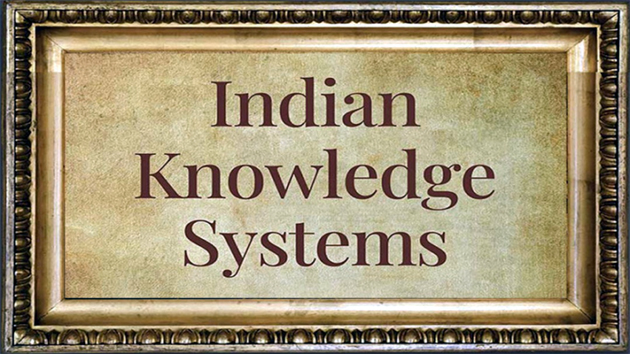“The real self of Bharat resides within its Ancient Wisdom”
Dr Vishal Sharma
When the entire world is striving for hunting for the fulfillment of their stomach, we in Bharat were centered on culinary research for the benefit of humanity.
When the entire world is struggling to learn languages for communication, we in Bharat have dedicated ourselves to chanting the ancient mantras of Ramayana and Mahabharata.
When the entire world is astonished by the secrets of Nature, we in Bharat were busy in formulating pioneering breakthroughs across diverse fields such as Economics, Political Science, Warfare, Sociology, Administration, Physics, Chemistry, Mathematics, Astronomy, Medicine, Astrophysics and numerous other realms of science and technology.
When the entire world delves into the accomplishments of Indian Rishis, we in Bharat transcend conventional science to explore another dimensions like consciousness, super consciousness, Meditation, and Samadhi.
Today, when the entire world is talking about sustainability, environment, renewable energy, climate change, culture, society, economy and many more, we, the people of Bharat, aspire to guide the world towards the reservoir of traditional knowledge that we have amassed over countless eras. Our intent is to contribute to the advancement of the entire planet, emphasizing the timeless belief held by Indians:
“The World is One Family-a principle we have embraced for millennia”.
In the contemporary era charactrized by rapid advancements in fields such as Nanotechnology and Artificial Intelligence (AI), the incorporation of the Indian
Knowledge System (IKS) might initially be perceived as archaic wisdom, reminiscent of age-old stories. However, when looked at in a more intelligent way, the amalgamation of IKS with mainstream education actually like infusing timeless wisdom into a modern package.
In a bold move towards embracing India’s rich cultural heritage, the University Grants Commission (UGC) has announced plans to introduce Indian Knowledge Systems (IKS) in the curriculum of higher education institutions across the country. This decision has ignited a nationwide discussion concerning its potential implications on cultivating a scientific temper among citizens and its approach towards modern science. IKS encompasses a diverse array of age-old wisdom, including realms like traditional medicine, astrology, yoga, meditation, and beyond. These enduring systems have been handed down across generations, playing a pivotal role in shaping India’s historical narrative and cultural identity.
India stands as a reservoir of culture, nurtured across millennia, and materialized through art, literary creations, customs, traditions, languages, artifacts, heritage sites, and more. Countless individuals worldwide engage with, relish, and gain from this cultural abundance – from touring India’s landscapes, embracing Indian hospitality, acquiring its handcrafted treasures and textiles, immersing in classical Indian literature, adopting yoga and meditation, drawing wisdom from Indian philosophy, joining in its distinctive festivals, savoring diverse Indian music and art, and countless other experiences. The safeguarding and advancement of India’s cultural wealth must be considered a high priority for the country, as it is truly important for the nation’s identity as well as for its economy. However, with the rise of modern science and the influence of globalization, there has been a notable shift towards Western scientific knowledge, resulting in the marginalization of IKS within mainstream education.
It’s truly heartening to observe that the National Education Policy (NEP-2020) has gone beyond simply acknowledging the glorious history of ancient India through the remarkable contributions of institutions like Nalanda and Takshashila. Instead, it has thoughtfully extracted the essential components from this legacy and integrated them into the foundation of the New Education Policy, both at the school and university levels.
There was an imperative need to acknowledge and draw inspiration from the groundbreaking discoveries of our ancient Rishis like Aryabhatta, Banbhatta, Bhaskaracharya, Chanakya, Chakrapani, Charaka, Panini, Patanjali, Pingala, Susruta, Sankardev, Thiruvalluvar, Varahamihira, and many others. Their accomplishments spanned across an array of fields including architecture, astronomy, civil engineering, fine arts, mathematics, metallurgy, medical science and surgery, navigation, and yoga – and it appears that this requirement has been recognized and addressed while formulating NEP-2020.
Notably, the distinguished institutions of ancient India like Nalanda, Takshashila, Vikramshila, and Vallabhi, set exceptional benchmarks for interdisciplinary education and research. They welcomed scholars and students from diverse backgrounds and countries, fostering an environment of intellectual exchange and growth. The policy emphasizes an intriguing concept – that all forms of creative human endeavor, whether they relate to mathematics, science, vocational subjects, professional pursuits, or soft skills, are to be considered ‘arts’. This perspective finds its origins distinctly in the Indian tradition.
The benefits of integrating IKS into mainstream education are manifold. It offers students a more holistic and comprehensive view of the world, promoting a deeper understanding of various disciplines and fostering a sense of interconnectedness. By embracing IKS, learners are exposed to diverse perspectives, encouraging critical thinking and creativity. This approach also cultivates an appreciation for indigenous knowledge, instilling a sense of pride in one’s heritage. Moreover, the integration of IKS can act as a bridge between the traditional and the modern. It blurs the artificial boundaries that separate disciplines and encourages a multidisciplinary approach to learning. This approach aligns with the original spirit of ancient institutions like Nalanda and Takshashila, which nurtured scholars from various fields in an environment of intellectual exchange.
In essence, the combination of IKS with current educational methodologies represents a harmonious synergy between ancient wisdom and modern innovation. It underscores the notion that despite the advancements in Nanotechnology and Artificial Intelligence, the foundational principles embedded within IKS offer a unique perspective that can enhance our understanding and application of these modern disciplines. This integration not only revitalizes the traditional knowledge for contemporary relevance but also enriches the current educational landscape with a broader spectrum of insights, thereby fostering a holistic and well-rounded approach to learning and problem-solving in the modern world. As we embark on this transformative journey, we are not merely embracing the past; we are crafting a path toward a more enlightened and harmonious future, where the wisdom of old enriches the innovations of today.
(The author is HOD Electronics, Govt. M.A.M College Jammu)
Trending Now
E-Paper


